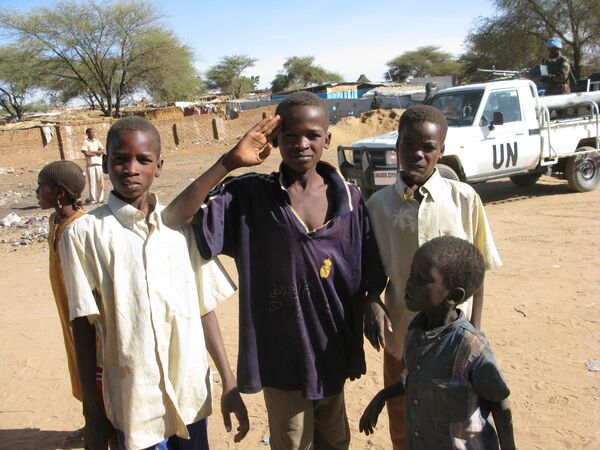Between January 9 and 15, a referendum on independence will be held in Southern Sudan, the largest African country. A majority in the predominately Christian South is expected to support separating from the predominately Muslim North after years of conflict.
The results of the voting will be announced within 30 days of the referendum, so Southern Sudan will be able to declare independence by mid-February at the latest. This prospective addition to the UN will be roughly the size of France with a population of eight million, of which 90% live on $1 a day. There are poorer countries in Africa, but none as large as Sudan. This is why Sudan’s stability is a major geopolitical issue.
A bright future?
According to the Sudanese Comprehensive Peace Agreement of 2005, Southern Sudan will have the right to form an independent nation if 60% of registered voters participate in the referendum and over 50% vote yes. Most likely, the first president of the new country will be Slava Kiir of the largest southern tribe, the Dinka, while Riek Machar of the Nuer tribe will become the vice president. Both were warlords during the civil war, and have been fighting over mineral resources in the past five years of the territory’s autonomy.
Oil and gas, the main resources of the North and South alike, could be a blessing or a scourge.
Ethnic, tribal and religious conflicts in Africa seldom end peacefully, especially where oil is the only liquid asset. Given that Sudan has been fighting a civil war essentially from the moment it gained independence in 1956, it would be naive to assume that separation will put an end to skirmishes, fights and massacres. Moreover, violence can spread to new territories. Even though there is little chance of a large-scale war between a North and South exhausted by constant fighting, there is still a chance of clashes between clans and tribes.
Cold war for black gold
Sudan’s oil reserves are unknown as prospecting is impeded by constant civil war. But estimates put reserves at 6.7 billion barrels. It is believed that there are large fields in northwestern and eastern Sudan and on the Red Sea Shelf. Currently, Sudan produces 450,000 barrels annually, and it can boost production to 700,000 or even 900,000, if respective facilities are modernized.
The latest civil war (1983-2005) claimed the lives of two million people and created as many refugees. One of the bloodiest episodes of that war was the Darfur massacre of 2003, when the forces of President Omar al-Bashir killed between 200,000 and 300,000 people, according to international organizations. Al-Bashir puts the number of casualties at ‘only’ 20,000-30,000.
In March 2009, the International Criminal Court accused al-Bashir of complicity in the Darfur genocide and issued a warrant for his arrest. This decision was supported by the United States, Britain and France, while Russia, China, India and the Arab League protested.
So it is clear which countries Southern Sudan will invite to its independence celebrations and which will get the cold shoulder.
Wisely, the Chinese have developed good relations with both Khartoum and Juba, the capital of Southern Sudan. Despite the civil war and the lack of guarantees of long-lasting relationships, China has been investing heavily in Sudan’s infrastructure, building roads, pipelines, hospitals, schools, nursery schools, stadiums and shops.
In the past 15 years, China has invested some $15 billion in Sudan. As Chevron, the first company to find oil in Sudan, wound down oil production in the country, the China National Petroleum Corporation was there to take its place. Twelve years ago China’s presence in Sudan was insignificant; today China accounts for 50% of Sudan’s exports. It is the largest shareholder in the four oil consortiums in Northern and Southern Sudan, holding stakes of between 40% and 47% in three of them and 95% in the fourth. China invested in building oil pipelines connecting Southern Sudan with oil terminal Port Sudan and consumes between 65% and 80% of Sudan’s daily oil production, which is shipped through the pipelines. China will not relinquish its foothold in the country to anyone.
Russia’s northern bias
Moscow has good relations with Khartoum and President al-Bashir, who in 2009 pledged friendship and many joint projects in the oil and energy sector. But his pledges were no more than declarations of intent on most issues, with the notable exception of student exchanges, which bring Sudanese students to Russian universities. Most of these students strive to remain in Russia after graduation.
Russia does not pose a serious challenge to the three major oil producers in the Sudanese territories – China, India and Malaysia. And the competition will become even tougher once American, British and French companies enter the Southern Sudanese market.
The United States has announced that by 2015 it plans to purchase a quarter of its oil from Africa, with Sudanese fields being a main source. Russia has never made much of an effort to become a major player in the Sudanese oil market, preferring ‘quick’ and ‘easy’ petrodollars instead. It has no base in Sudan and hardly any incentive to develop the local El Dorado of oil, while China needs Sudan to diversify its energy supplies and ensure its energy security.
The referendum is being watched closely in Africa and the Middle East and indeed any country with separatist sentiments. Arabs are not pleased with the idea that Sudan can be divided into Muslim and Christian states or with the prospect of the North falling into the hands of Islamic radicals. President al-Bashir has stated that if Southern Sudan withdraws, he will strengthen the Islamic regime and impose Sharia law throughout the country. Few countries relish the idea of having to deal with another radical Islamic state ruled by a president who sympathizes with al-Qaeda.
The views expressed in this article are the author’s and do not necessarily represent those of RIA Novosti.



